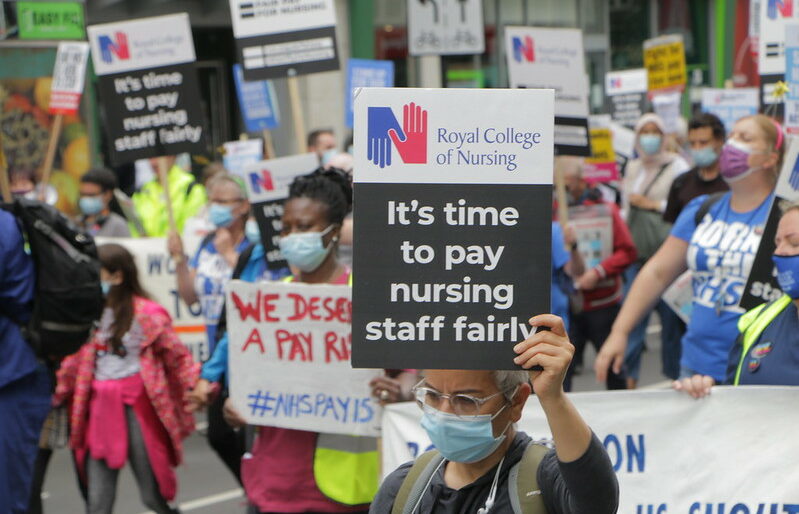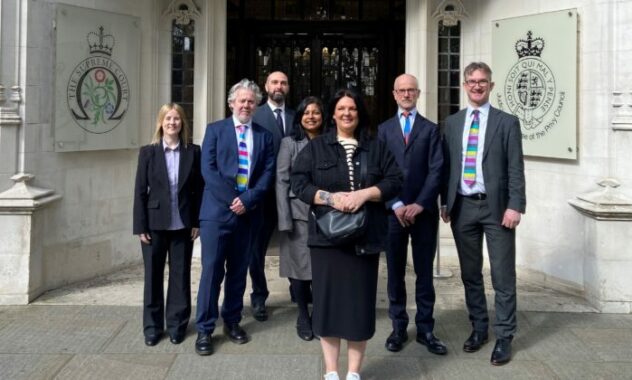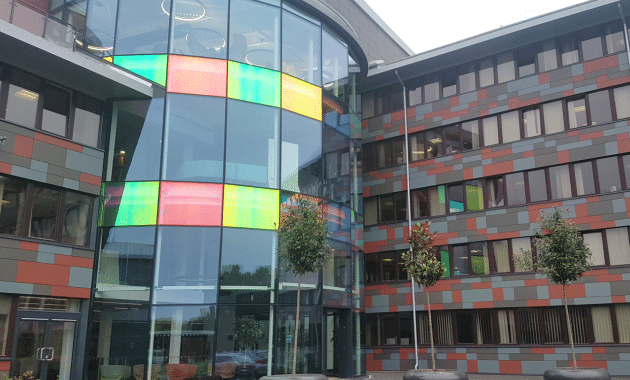Nursing staff will soon vote on whether to go on strike for the first time in their history
Nurses will vote next month on whether to strike over pay in what is being called a "defining moment" for the profession.

The Royal College of Nursing (RCN) has said in a statement that they will encourage RCN members working for the NHS in England and Wales on Agenda for Change contracts to vote in favour of strike action.
If enough members vote for industrial action, it will be the first time in RCN history that members in England and Wales go on strike. RCN Council, made up of elected members, has increased their strike fund to £50 million (up from £35 million) to provide some financial support to members who lose earnings during any industrial action.
The ballot has been called by members in response to the latest NHS pay award. The union had asked for a fully funded pay rise of 5% above inflation, which is currently 11.8%, to combat years of wage stagnation and the cost-of-living crisis. Instead, the government announced a much lower pay award of £1,400 for all NHS pay bands, enhanced for the top of Band 6 and band 7 so their pay award becomes 4%. This leaves an experienced nurse over £1,000 worse off in real terms.
Nursing professionals are at the heart of our health and care services but find themselves unable to afford the basics. It’s a national disgrace. Stand up for nursing today – watch and share the reality facing the profession. #FairPayForNursing https://t.co/B7CJKy1FBu pic.twitter.com/cVMcU2prCS
— The RCN (@theRCN) August 10, 2022
Industrial action is a last resort, but the current NHS staffing crisis is causing unacceptable risk to patients and nursing staff. That’s why we’re urging members to vote in favour of industrial action. Said the union.
The postal ballot on industrial action will open on 15 September.
Pat Cullen, RCN General Secretary & Chief Executive, said:
“Nursing staff will stop at nothing to protect their patients. Staff shortages are putting patient safety at risk and the government’s failure to listen has left us with no choice but to advocate for strike action.
A lifetime of service must never mean a lifetime of poverty. Ministers’ refusal to recognise the skill and responsibility of the job is pushing people out of the profession.
The next prime minister must change course urgently.”
Meanwhile, a ballot of Unite the union members across the NHS in England and Wales is now underway taking the possibility of strike one step closer over the nations’ respective governments’ pay settlements for the coming year.
Unite is recommending its members vote yes to industrial action.
The union has slammed the imposed pay settlement, which works out at four per cent for those in the middle pay bands while inflation hovers at just under 12 per cent, as a `massive national pay cut’ for NHS professionals such as scientists, health visitors and speech and language therapists.
Unite will now consult with its 100,000 health members across the NHS in both England and Wales on whether they accept this imposed deal or want to challenge it through industrial action, which could mean strikes this winter.
Unite General Secretary Sharon Graham said:
“This offer is nothing other than a massive national pay cut for NHS staff. After everything they have been through with the Covid pandemic and the service this workforce gives this country day in, day out, this is a kick in the teeth from the government and an insult to staff and patients alike.
This ballot is a chance for our members to have their say, and whatever they decide, they will have the full backing of their union, Unite.”
With no extra money from the government to fund the pay deal, Unite is angry that workers’ pay is being pitted against patient care in a health service that is already at breaking point.
In England, the ballot closes on Sunday 11 September.
Unite’s National Officer for the NHS, Colenzo Jarrett-Thorpe, said:
“For the government to demand that even this insulting pay offer is funded through existing NHS money is an appalling, irresponsible move. The health service is already at breaking point and needs urgent investment to stave off collapse but we also need to reward staff properly. There are already 40,000 vacancies across the NHS. This dreadful pay offer will only make it far harder to recruit and retain staff.”
In Wales, the ballot closes on Friday 15 September.
At a time when wages have been held down in the sector for over a decade, the NHS Pay Review Body and their report are being heavily scrutinised. This latest round of proposed action could be a symptom that union members are starting to question whether pay review bodies are fit for purpose, and indeed whether they are even independent of Government, or effective at addressing working poverty. The latest ballots triggered seem to chime with what the IER has long stated, that pay review bodies are not independent in practice, and are no substitute for proper sector wide collective bargaining.







